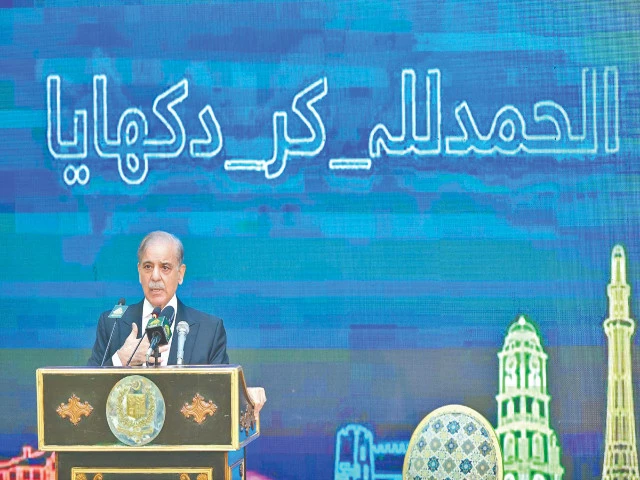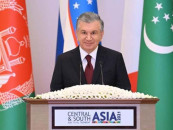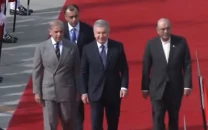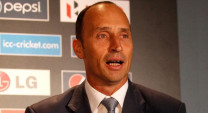PM unveils massive power relief, cuts tariffs by Rs7.41/unit
Says industries to pay Rs7.69 less per unit; 40.3m consumers to benefit from reduced tariffs

Prime Minister Shehbaz Sharif on Thursday announced to reduce electricity prices by 15% or Rs7.41 per unit on account of seasonal tariff adjustments and by increasing budget-neutral subsidy to boost consumption from national grid and providing solace to financially struggling families
The benefit has been given to about 40.3 million consumers, mainly 35 million residential users.
The prime minister announced the new electricity rates at the Prime Minister's Office, at a ceremony attended by people from all walks of life.
The prices have been cut on account of quarterly tariff adjustment, monthly fuel cost adjustment, consequent reduction in taxes and also by increasing the petroleum-funded subsidy, according to the government officials.
There is about Rs3.40 per unit reduction due to quarterly tariff adjustment, less than Rs1 per unit monthly fuel cost reduction and increasing subsidy by Rs1.71 per unit, they added. This will reduce the bill by Rs6 per unit and after adding the impact of taxes on lowered price, the total impact will be Rs7.41 per unit.
Compared to the existing rates, the domestic electricity prices have been reduced by Rs7.41 per unit and the new average rate will be Rs34.37 per unit, said the prime minister and added that the electricity price for the industries have also been reduced by Rs7.69 per unit to Rs40.51.
The prime minister said that his government had to face "greater difficulties" in convincing the International Monetary Fund to reduce the electricity prices, despite the fact that it was not willing to allow even the budget-neutral cut in the prices.
"The IMF was not allowing us to reduce the prices by increasing the petroleum levy rate and then I had to tell them that I would talk to the Managing Director of the IMF to get the permission as there was no impact of the reduction in the prices on the budget," said the prime minister.
The maximum relief of Rs8.58 per unit or 12% has been announced for the commercial consumers and Rs7.69 per unit or 13% for the industrial consumers. The households have been given a relief of Rs6.14 to Rs6.71 per unit, a reduction of 17% to 32%.
The prime minister gave the credit of the reduction to Power Minister Sardar Awasi Leghari, Privatisation Adviser Muhammad Ali and PM's Task Force on Power Sector's national coordinator Lt General Zafar who did the hard task of 'convincing' the owners of the power plants to renegotiate terms of their deals.
According to new rates, there is no reduction in prices for the lifeline consumers of up to 100 units who have already been paying far lower than the cost of generation of electricity. The prices for the protected residential consumers having up to 100 units consumption have been reduced by Rs6.14 per unit or 32% to Rs8.52 per unit.
The prices for protected consumers with 200 units consumption have been reduced by Rs6.14 per unit to Rs11.51, excluding taxes. The consumers of up to 300 units will get a benefit of Rs7.14 per unit but their rate will be Rs34.
The residential consumers of more than 300 consumptions will get a relief of Rs7.24 per unit and their new rate will be Rs48.46 per unit.
The average price for domestic consumer will be Rs31.63 with a cut of Rs6.71 or 17%.
This is still a small relief, which has been obtained through ingenious methods, said the prime minister, while acknowledging the hardships faced by the households and industries.
A pensioner was left with empty pockets after paying his electricity bills and these high bills caused frustration and anger among people, admitted the prime minister. He said that the government was undertaking structural reforms in the power sector to ensure further relief for the consumers and overall development of the country. "This reduction will help industrialists produce cheaper and more competitive products."
The commercial consumers' revised rate will be Rs62.47 per unit with 12% reduction. The industrial consumers' new rate will be Rs40.51 per unit after Rs7.69 or 13% reduction. The agriculture rate will be Rs34.58 after Rs7.18 or 17% reduction in prices.
The prime minister also set the agenda for further reforms in the power sector, giving a task to his "star team" to start working on eliminating over Rs600 billion per year losses due to theft and low recovery of bills.
The prime minister said that the other two goals for his government were to establish an open market of electricity and either privatising or provincialising power distribution companies (DISCOs) to reduce the burden of line losses and power theft on the national exchequer.
Appreciating the task force formed to finalise power reforms, the prime minister said the force worked really hard and through their innovative thoughts, they brought different options and managed to convince the IMF to reduce power tariffs.
"We did not pass on the low international petroleum prices and retained the prices to ensure that the government will reduce power tariffs to which the IMF agreed in principle," he added.
The prime minister said the government successfully negotiated with the Independent Power Producers (IPPs), which will save Rs3.7 trillion over a period of three years to 25 years of the remaining lifespans of these power producers.
The prime minister said that the Rs2.4 trillion circular debt is also being dealt with, which will be brought to zero over a period of five years.
The prime minister said Pakistan was on the verge of default over a year ago and he had to oversee that letter of credits for importing petroleum products and other essential items are opened timely. "We did not have resources to even run the power sectors as well," he added.
The prime minister said Pakistan's economy had now become stabilised and was moving towards sustainable growth and development.
"The country's economy badly needed a surgical operation to get rid of all the issues responsible for the crisis in the economic sector," he added.






















COMMENTS
Comments are moderated and generally will be posted if they are on-topic and not abusive.
For more information, please see our Comments FAQ